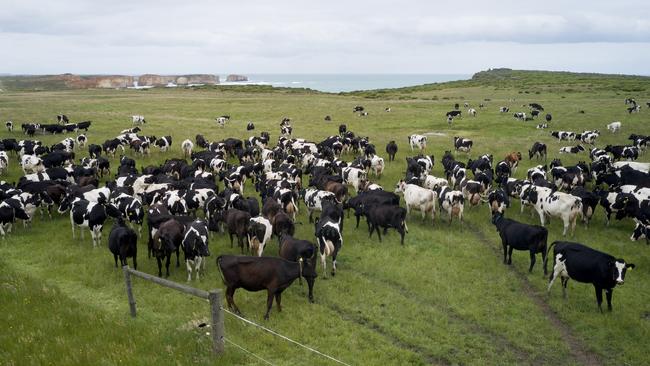Definition of ’healthy diet’ is based not on health, but UN-approved veganism
The new “green” food ideology that has infected the National Health and Medical Research Council is worse than no help when you are feeding a large family.

Meat was and still is a staple of the Australian diet in most households. It is certainly not as cheap as it was. We now have long conversations about the meat specials, and cooking from scratch is often difficult for working parents. However, our diet and cooking are now more diverse, and since fruit, vegetables and grains are still the cheapest food items, our food culture doesn’t exactly discourage vegetarianism.
Yet, the new “green” food ideology that has infected the National Health and Medical Research Council threatens this cornucopia by putting “sustainable” front and centre as a criterion for healthy consumption of food. This has nothing to do with health and nutrition. Ironically, it also has nothing to do with the way Australian food is actually produced because Australian farmers are not only some of the world’s best producers of food in terms of quantity, but also in terms of sustainability.
Australian farmers and graziers are some of the most efficient in the world. They produce enough food for 75 million people. Sixty five per cent of our food is exported, which makes us one of the world’s major food exporters. Australia is also a leader in sustainable farming practices. But the NHMRC is not talking about sustainable farming practices for a nation that already feeds many nations other than ourselves. No. It is talking about so-called “sustainability” in the context of nutritional choices, and this has nothing to do with nutrition. But more, it is pointless in the Australian context. Our farming practices are “sustainable” or our agriculture wouldn’t be so successful. Perhaps the NHMRC should just change its advice to simply “Buy Australian”.
Basically, sequestering the idea of sustainability of food production into recommendations about nutrition is aimed at lessening meat consumption and, consequently, production. The UN and WHO are now obsessed with the effect of methane emissions on global warming. By placing “sustainable” and “equitable” (whatever that is) before nutritious and cheap in the nutritional criteria of what the average householder should consume, the NHMRC is really disguising an ideological diktat that comes straight out of the UN and WHO climate change propaganda textbook.

And propaganda it is. The UN’s Food and Agriculture Organisation, founded after WWII to encourage food production in countries where people were literally starving, has switched its entire focus to climate change. Now the global dietary guidelines have a list of recommendations as food guide advice all centred on climate change and, frankly, trying to steer us to veganism. However, ironically, we are now doing so well in world agriculture that the FAO begins its dire predictions with the awkward fact that too many of us have too much. No longer starving, too many are fat: “Three billion people cannot afford a healthy diet. Two billion are overweight or obese.” So, what is a “healthy diet”? The propaganda continues: “Meat and dairy provide just 18 per cent of calories … shifting to healthy diets that include sustainability considerations can contribute to reductions in environmental impacts … A diet that is higher in plant-based foods, such as vegetables, fruits, whole grains, legumes, nuts and seeds, and lower in animal-based foods, has a lower environmental impact.”
So, the definition of “healthy diet” is based not on our health, but UN-approved veganism. However, as any Australian mum (and pediatrician) can tell you, a vegan diet is not only expensive and difficult, it is not particularly “healthy”. It is inadequate for growing children because it lacks first-class protein such as meat and milk. What is more, the UN uses the North American standard of lot-fed cattle to decry methane emissions that affect the environment, while Australia’s grass-fed animals produce minimal in comparison. So, the NHMRC has picked the UN propaganda as its standard.
For ages we have been told eating meat every day is bad for your health, especially of your gut. It is fine for the NHMRC to talk about that as it falls into health. However, sustainability is not related to individual health and nutrition no matter how much propagandising the UN does. What is worse, it is fuelling food faddism. Everything from largely imaginary “intolerances” to veganism being a more virtuous way of life – and not just for Cistercian monks. The “I am so green and virtuous” is an elitist mindset of modern life that is encouraged by the NHMRC by dressing up ideology as nutrition.
So, should we ignore this “sustainability” propaganda? Back home at the Shanahans, one son newly arrived from living in America, impervious to food faddism and sighing with satisfaction after a steak, remarks: “Mum, Aussie meat is so much better than American!” So, my answer is yes. Ignore the NHMRC. We are a nation blessed with its food. Bon appetit!




One of the first questions people asked me when I had all my nine children at home is: How the heck do you feed them? My answer was always that I am a practical mum, chief cook and nutritionist. Food was, and still is, relatively cheap and plentiful: meat and potatoes, eggs, pasta, rice, green vegetables, salad, bread (two loaves daily), cheese and a box of fruit were our basics, washed down with five litres of milk daily. We shopped for price and cooked simply from scratch, no sweet cereals, snack food, biscuits or soft drink – expensive empty calories. Ask yourself: How many places in the world could people sit down to a weekly roast, or barbecue a steak, or even forequarter chops – or a stew made of the scornfully labelled “gravy beef”? It was all about nutrition.